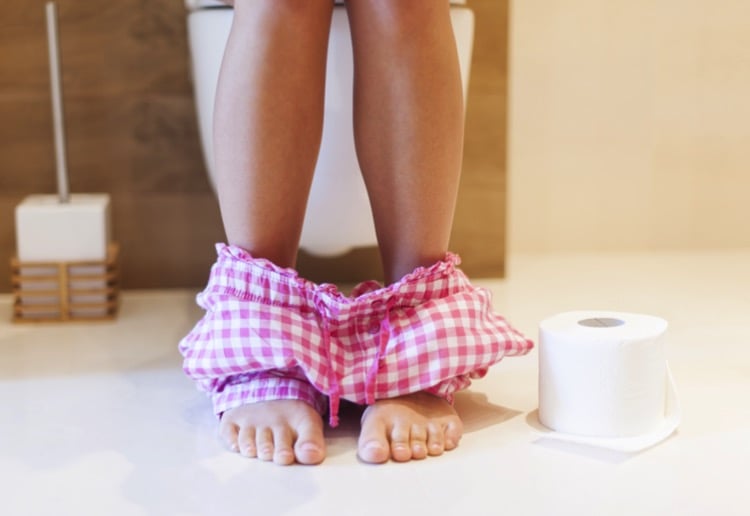Sure, hit the gym, pavement – whatever – to get into shape. But don’t make these seven common mistakes that can put unnecessary strain on your pelvic floor and exacerbate bladder leakage
Drinking excessive amounts of water.
This crazy idea that “the more water you drink the better” is a load of clever marketing bunkum. There is no evidence that drinking more water that what our thirst dictates has any health benefits. In fact, excessive fluid intake can do the opposite; it can put strain on the heart (because of the increased blood volume) and, in extreme cases, lead to hyponatremia (swelling of the brain), risking seizures and even death.
By overfilling your bladder, you put extra strain on your urinary sphincter (the ring of muscle that we relax to urinate), which increases the risk of leakage, particularly when exercising.
Overfilling your bladder is not a good idea for the long term either; if you regularly overfill it, the continual stretching of the balloon-like bladder muscle causes it to lose its elasticity, and eventually, its ability to empty properly. Thirst is the best guide as to how much you should drink.
Doing aerobic exercises when your pelvic floor muscles aren’t strong enough.
If you leak when you jog, skip or play sport, you’re not alone. Studies consistently show about 30 percent of women have the same problem. But just because it’s common, doesn’t mean it’s normal or OK.
Bladder leakage is due to the lax supports of your bladder and weak pelvic floor muscles. If they aren’t strong enough to withstand the pressures of high impact exercise, they need to be strengthened, just like any other muscles in the body.
You can get your pelvic floor muscles into better shape by doing pelvic floor exercises every day. Go to continence.org.au for instruction.
However, with a third of the population unable to follow written instructions properly, it is a good idea to get professional help and seek out a pelvic floor physiotherapist or continence nurse who can help you get the correct technique and train your pelvic floor muscles the right way. (Phone the National Continence Helpline 1800 33 00 66, and they’ll locate your nearest continence health professional.)
Looking after these important muscles, which form part of the core group of muscles, has much wider implications. They are important for optimising sexual pleasure and function, and for holding the pelvic organs in place, i.e. preventing prolapse – a condition that affects one in four women.
Doing resistance or core strength exercises that cause you to strain down.
If you’re straining and pushing your pelvic floor down – whether you’re doing core strength exercises, sitting on the toilet constipated, or lifting a child – you’re creating a lot of downward pressure on your pelvic floor. Too much of this too often can weaken your pelvic floor so that it loses its elasticity, risking incontinence.
Before you do any activity likely to cause you to strain down, lift and engage (squeeze) your pelvic floor and always remember – breathe throughout the exercises.
If you have symptoms of urinary leakage or prolapse, avoid full squats, and keep your legs no more than shoulder width apart if doing half-squats.
Being constipated.
Believe it or not, constipation can contribute to urinary leakage. A rectum full of hard stools is difficult to empty and can cause straining. Forcing to empty the bowels can weaken the bladder supports and make urine leakage with coughing and during exercise more likely.
It’s important you do your best to avoid constipation. Along with the usual advice (plenty of fibre, in the form of vegies, fresh fruit and wholegrain cereals, adequate fluids and exercise) another useful tip is to go to the toilet to empty the bowel as soon as you get the urge. For a lot of people, there is an urge to empty the bowel in morning after breakfast. That’s a great time to go – before you head out of the house – because the next toilet might be hours away. If you repeatedly ignore the urge, the waste will dry out in in the rectum, making things harder, leading to constipation and straining.
Wearing panty liners.
OK, so panty liners won’t make you incontinent; it’s more a case of what they’re not going to do, i.e. address the problem of bladder leakage.
By wearing pads every day you’re essentially resigning yourself to bladder leakage as inevitability. It’s not, and may only get worse if you don’t do something about it.
Incontinence is curable in the majority of cases, often by doing a structured pelvic floor training program. Lifestyle changes too, such as reducing excess weight, particularly waist circumference, and avoiding constipation can help too.
A good first port of call is to talk to one of the continence nurse advisors on the free National Continence Helpline (1800 33 00 66).
Not relaxing your pelvic floor muscles
No muscles in the body are meant to be held tight all the time, and that includes the pelvic floor muscles. It’s good to squeeze them up and in, but it is also important to let them relax and soften. Too much tightening without relaxing can cause excessive tension and pain in the muscles, making intercourse uncomfortable and tampons painful to insert. If this happens, call the Helpline (1800 33 00 66) and find a pelvic floor physiotherapist who can help with pelvic pain.
Wearing a core trainer
Core trainers are essentially resurrected, rebranded Victorian-era corsets, these days promoted for use during exercise to speed up the waist-contouring and slimming processes. Manufactures claim that, by compressing the abdomen, core trainers ”work around your core muscles to help push it inward to achieve a slimmer waist while stimulating thermal activity that results in ramped up perspiration”.
Compressing the abdomen in this way forces the diaphragm high into the chest cavity and the pelvic floor down into the pelvis. This constant downward pressure puts additional strain on the pelvic floor, which increases the likelihood of bladder leakage or prolapse for a woman already at risk, with any additional pressure when exercising further exacerbating the problem.
Consult a pelvic floor physiotherapist or continence health professional before considering a core trainer.
This information is provided by Continence Foundation of Australia (continence.org.au), the peak national body organisation working to improve the quality of life of all Australians affected by incontinence. For more information go to continence.org.au
Do you have any other tips for preventing bladder leakage? Share with us below.
Image source Shutterstock.




















-

-
-
meedee said
- 15 Oct 2021
-

-
-
mom176887 said
- 24 Apr 2017
-

-
-
ella12 said
- 19 Oct 2016
-

-
-
mom19782016 said
- 13 Oct 2016
-

-
-
rovermum said
- 10 Oct 2016
-

-
-
mom134803 said
- 08 Oct 2016

-

-
-
mom101628 said
- 07 Oct 2016
-

-
-
mom64356 said
- 26 Sep 2016
-

-
-
mom93821 said
- 26 Sep 2016
-

-
-
mom160421 said
- 26 Sep 2016
Post a comment12:19 pm
1:31 pm
3:24 pm
12:36 pm
10:34 am
3:23 am
10:42 pm
8:17 pm
-

-
-
mom93821 replied
- 27 Sep 2016 , 6:58 am
Reply6:20 pm
12:16 pm
To post a review/comment please join us or login so we can allocate your points.